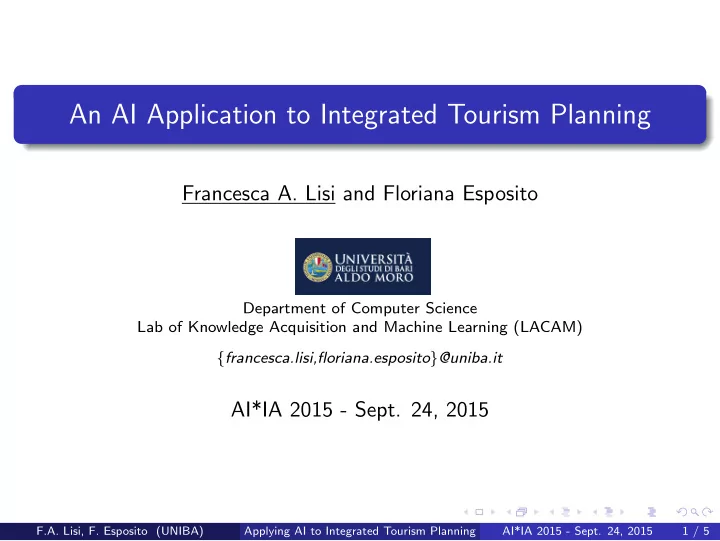

An AI Application to Integrated Tourism Planning Francesca A. Lisi and Floriana Esposito Department of Computer Science Lab of Knowledge Acquisition and Machine Learning (LACAM) { francesca.lisi,floriana.esposito } @uniba.it AI*IA 2015 - Sept. 24, 2015 F.A. Lisi, F. Esposito (UNIBA) Applying AI to Integrated Tourism Planning AI*IA 2015 - Sept. 24, 2015 1 / 5
Challenges of the application domain Integrated Tourism Kind of tourism which is explicitly linked to the localities in which it takes place and, in practical terms, has clear connections with local resources, activities, products, production and service industries, and a participatory local community. .. in urban areas? Cornerstone of a policy of urban development Combination of a competitive supply able to meet visitors’ expectations 1 a positive contribution to the well-being of residents 2 F.A. Lisi, F. Esposito (UNIBA) Applying AI to Integrated Tourism Planning AI*IA 2015 - Sept. 24, 2015 2 / 5
Our solution in a nutshell Semantic Technologies Domain ontology in OWL Ontology population with Web Information Extraction Semantic Web Services in OWL-S Machine Learning Induction of fuzzy OWL inclusion axioms incompleteness of Web data vagueness of notions such as closeness of sites Improving services by learning from users’ feedback F.A. Lisi, F. Esposito (UNIBA) Applying AI to Integrated Tourism Planning AI*IA 2015 - Sept. 24, 2015 3 / 5
A case study from the Apulia Region Pilgrimage to St. Nicholas’ Basilica in Bari F.A. Lisi, F. Esposito (UNIBA) Applying AI to Integrated Tourism Planning AI*IA 2015 - Sept. 24, 2015 4 / 5
Acknowledgements This work was partially funded by the Italian PON R&C 2007-2013 project PON02 00563 3489339 “ Puglia@Service : Internet-based Service Engineering enabling Smart Territory structural development”. F.A. Lisi, F. Esposito (UNIBA) Applying AI to Integrated Tourism Planning AI*IA 2015 - Sept. 24, 2015 5 / 5
Recommend
More recommend